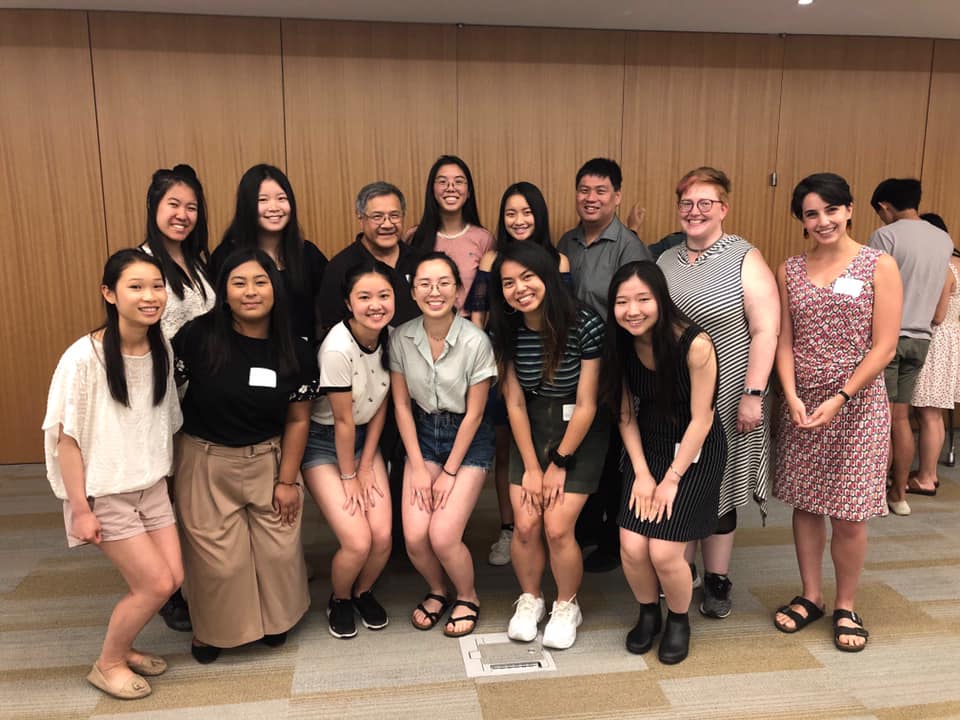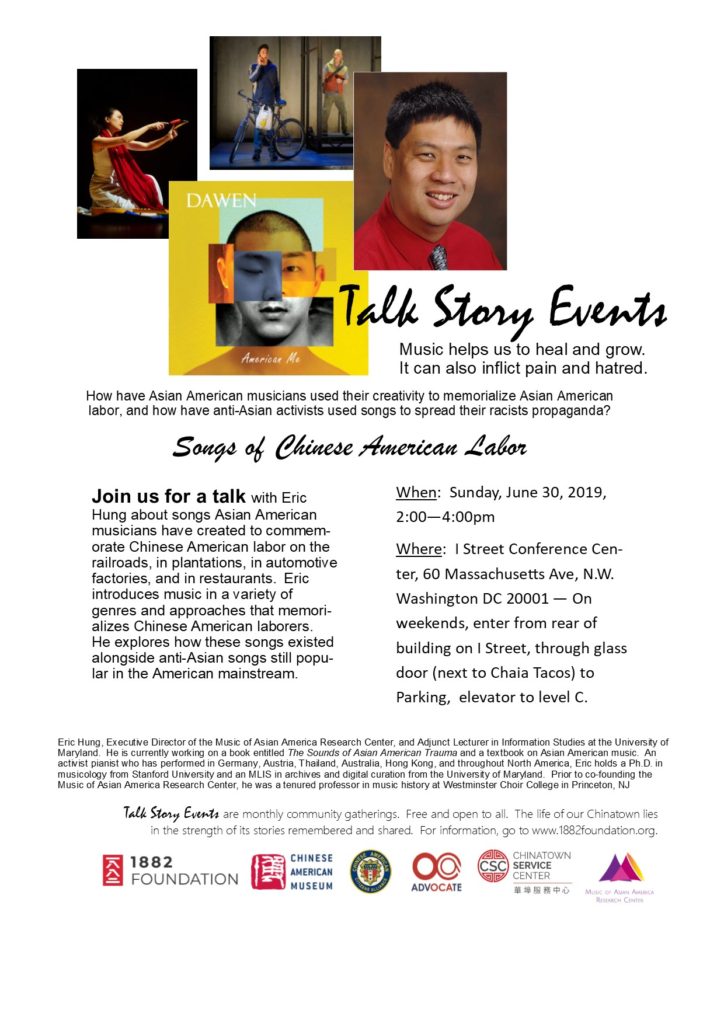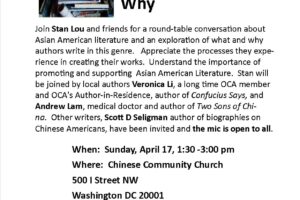Written by Amy Dai and Jiajia Zhang
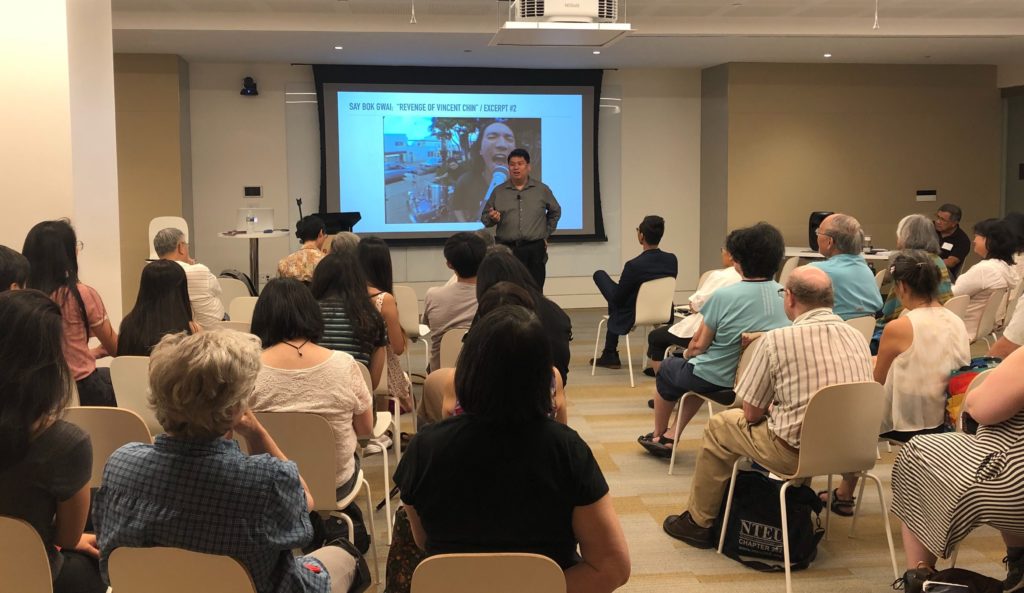
Introduction
On June 30th, the 1882 Foundation was proud to host Mr. Eric Hung to present at our monthly Talk Story. Based in Princeton, New Jersey, Hung serves as the director of the Music of Asian America Research Center and is an Associate Professor of Music History at Rider University’s Westminster Choir College. His research focuses on Asian American film and experimental music.
Ted Gong, Executive Director of the 1882 Foundation, commenced the event by introducing 1882 Foundation’s long-term collaborator, the District of Columbia Public Library (DCPL) System. Maggie Gilmore, our DCPL partner, showed the audience the wide variety of resources they have access to with a registered DC Public Library card. These resources include the Alexander Street collections—a series of musical databases—and Freegal, a music service were library users can download free music weekly.
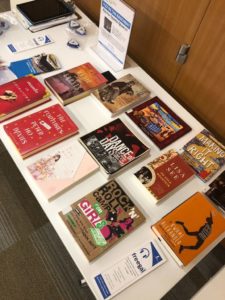
Ms. Gilmore played for audiences “We Are the Children” (1973), and Wu Man’s “Night Rider” (2005), two examples of Asian American music available on the aforementioned sites. Lastly, Ms. Gilmore presented the most exciting information of all: the Martin Luther King Jr. Memorial Library is set to open in the fall of 2020 and promises a revamped collection of Asian American works: books in Chinese language, classics, and an Asian American novel series.
Wang Dawen's "Kuli" and the Transcontinental Railroad Workers
Mr. Eric Hung kicked off his presentation by posing an open question to the audience: what is music for?
Audience responses included, “listening pleasure,” “self-expression,” “protest,” “dance,” “storytelling,” “stress management,” and “tradition.”
Hung then introduced Wang Dawen, a second generation Chinese American from Chicago, whose work embodies a number of the audience’s suggested musical purposes. Dawen is a singer-songwriter known for his politically conscious, original music. Mr. Hung played Dawen’s “Ku Li.” “Ku Li,” or “Coolie,” pays tribute to, raises awareness of, and opens conversations regarding discrimination against Chinese railroad workers in America. From a railroad worker’s perspective, Dawen consistently refers to “a better…” before his voice trails off with no specific identification of what is “better.” Hung discussed this artistic choice with the audience before the room agreed that “Ku Li” emphasizes how the Chinese did not really experience a better_______, although they remained optimistic for future generations of Chinese Americans to come.
Jen Shyu and "The Chinese Cuban Question"
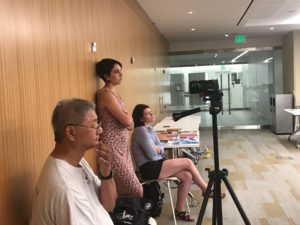 Hung then discussed Jen Shyu, whose music on Asian American labor extends beyond the United States. Shyu is a free jazz vocalist and composer of Taiwanese and East Timorese descent. In 2009, she recorded an album called “Jade Tongue,” which features a tripartite piece called “The Chinese Cuban Question.” The piece, combining free jazz instrumentals with vocals—spoken and sung—discusses the Chinese laborers who were sold to Cuba as slaves in the Nineteenth Century. Shyu pulled much of her lyrics directly from the 1876 Cuba Commission Report, compiled by the Qing Dynasty imperial mission sent to investigate the gruesome conditions that befell Chinese American slaves in Cuba. In the piece’s final movement, Shyu, in her own words, implores, “will it always be a tragic demise of the innocent and wise, or is there some kind of hope we foresee will be the ones that come to be?”
Hung then discussed Jen Shyu, whose music on Asian American labor extends beyond the United States. Shyu is a free jazz vocalist and composer of Taiwanese and East Timorese descent. In 2009, she recorded an album called “Jade Tongue,” which features a tripartite piece called “The Chinese Cuban Question.” The piece, combining free jazz instrumentals with vocals—spoken and sung—discusses the Chinese laborers who were sold to Cuba as slaves in the Nineteenth Century. Shyu pulled much of her lyrics directly from the 1876 Cuba Commission Report, compiled by the Qing Dynasty imperial mission sent to investigate the gruesome conditions that befell Chinese American slaves in Cuba. In the piece’s final movement, Shyu, in her own words, implores, “will it always be a tragic demise of the innocent and wise, or is there some kind of hope we foresee will be the ones that come to be?”
The Lynching of Vincent Chin, in Two Musical Genres
The presentation’s final segment exposed audiences to two artists whose music addresses the 1982 racially motivated murder of Vincent Chin. In “Are You Chinese or Charlie Chan?” (1984), Musician Jon Jang simultaneously pays homage to Vincent and references Charlie Chan, a popular American film character in yellowface. Jang explores the fact that, in Hung’s words, “the white man—the fake Chinese—is alive and well. Vincent Chin—the real Chinese—is dead.” Throughout the song, Jang utilizes a series of changing musical styles from different musical eras to emphasize his point and incorporates chants from the original pan-Asian protests sparked by Vincent’s death.
In “Revenge of Vincent Chin” (2017), Say Bok Gwai, San Francisco’s first Chinese American hardcore metal band, gives a factual narration of the hate crime and expresses anger and frustration at its occurrence.
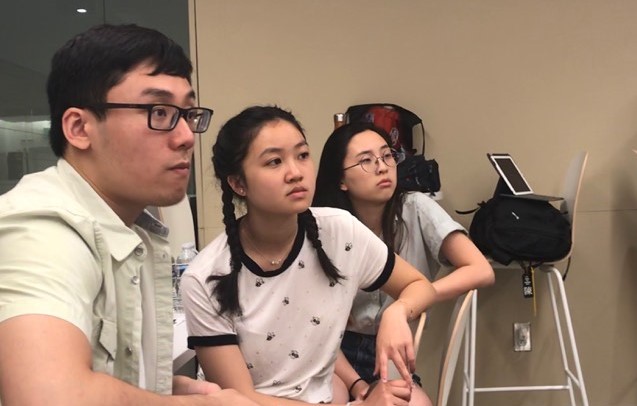
Q&A Session
A question and answer session concluded Hung’s Talk Story session. One audience member asked whether there was a specific definition for “Asian American music.” Does it encompass any music created by Asian Americans? How long does someone need to stay in America to be considered “Asian American?” In Hung’s opinion, there is no concrete definition to what is required to qualify as “Asian American,” as artists can choose their own identity as long as artists feel they have enough experience living within American society.
Next, an audience member asked Hung to share his thoughts on any change that should happen in terms of Asian American activism. Hung’s response resonated throughout the audience as he replied that internal divisions in the general Asian American population, along the lines of differing ethnicity and interests, have hindered pan-Asian progress in the past. The best way to advance Asian American civil rights, Hung believes, is for the Asian American activists to find solidarity among themselves.
